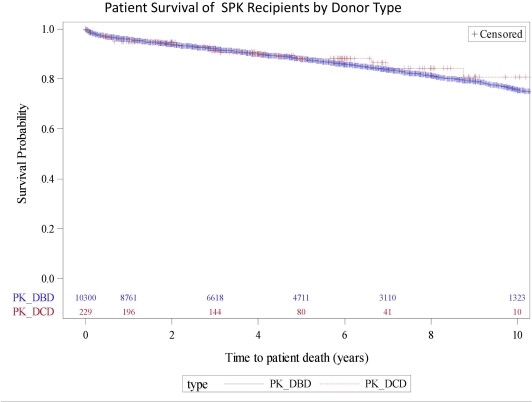Donation After Cardiac Death Dose Not Impact Short and Long Term Graft Outcomes in Simultaneous Pancreas and Kidney Transplantation.
1Washington University in St. Louis, St. Louis
2Saint Louis University, St. Louis.
Meeting: 2016 American Transplant Congress
Abstract number: 303
Keywords: Donation, Outcome, Pancreas transplantation
Session Information
Session Name: Concurrent Session: Clinical Pancreas Transplantation 1
Session Type: Concurrent Session
Date: Monday, June 13, 2016
Session Time: 4:30pm-6:00pm
 Presentation Time: 5:42pm-5:54pm
Presentation Time: 5:42pm-5:54pm
Location: Room 309
Background:
Organ donation after cardiac death (DCD) has the potential to expand the pool of available organs for transplantation. Because of the concern that warm ischemia time affects pancreas graft survival, the utilization of DCD pancreas transplants either alone or as part of simultaneous pancreas-kidney (SPK) transplantation has been limited.
Methods:
We performed a retrospective analysis of Organ Procurement and Transplantation Network (OPTN) records for SPK transplants in the U.S. between 2000 and 2013. SPK recipients were stratified according to donor type as DCD or donation after brain death (DBD). Associations between donor type and post-transplant graft failure and patient death were examined by Cox regression including adjustment for recipient, donor and transplant factors.
Results:
During the study period, 10540 patients with type 1 diabetes underwent SPK. Of these, 4.6% (n=230) were procured from DCD donors. DCD donors were more likely to be white (83% vs. 67%) and more commonly to be expired secondary to Anoxia (32% vs. 12%) compared to DBD. Age, sex, and body mass index were similar between the two groups. At 3 months, recipients of DCD and DBD SPK transplants had similar (P>0.05) rates of pancreas survival (91% vs. 90%), kidney survival (97% vs. 96%), and patient survival (98% vs. 98%). After multivariate adjustment, DCD transplantation was not associated with increased risk of pancreas graft failure (aHR 0.78, CI 0.59–1.03), kidney graft failure (aHR 0.94, CI 0.7-1.24), or patient death (aHR 0.87, CI 0.58-1.31) at 3 months. Outcomes remained similar for recipients of DCD and DBD transplants at 1, 3, 5, and 10 years. 
Conclusion:
SPK transplants from DCD donors have comparable short and long term graft and patient outcomes as t DBD transplant. The use of DCD pancreas in the setting of SPK should be revisited.
CITATION INFORMATION: Alhamad T, Taha A, Lentine K, Wellen J, Garonzik-Wang J, Brennan D. Donation After Cardiac Death Dose Not Impact Short and Long Term Graft Outcomes in Simultaneous Pancreas and Kidney Transplantation. Am J Transplant. 2016;16 (suppl 3).
To cite this abstract in AMA style:
Alhamad T, Taha A, Lentine K, Wellen J, Garonzik-Wang J, Brennan D. Donation After Cardiac Death Dose Not Impact Short and Long Term Graft Outcomes in Simultaneous Pancreas and Kidney Transplantation. [abstract]. Am J Transplant. 2016; 16 (suppl 3). https://atcmeetingabstracts.com/abstract/donation-after-cardiac-death-dose-not-impact-short-and-long-term-graft-outcomes-in-simultaneous-pancreas-and-kidney-transplantation/. Accessed February 17, 2026.« Back to 2016 American Transplant Congress
